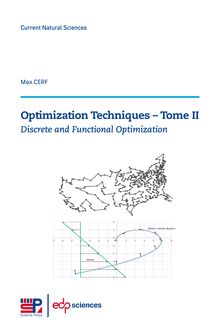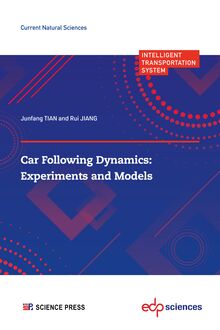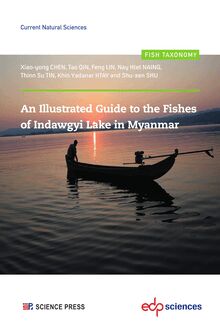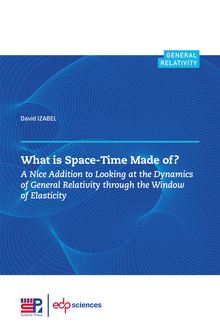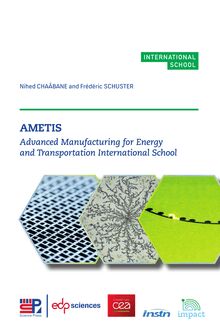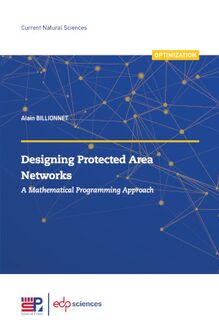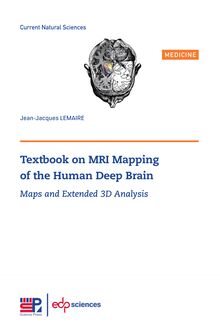-
 Univers
Univers
-
 Ebooks
Ebooks
-
 Livres audio
Livres audio
-
 Presse
Presse
-
 Podcasts
Podcasts
-
 BD
BD
-
 Documents
Documents
-
- Cours
- Révisions
- Ressources pédagogiques
- Sciences de l’éducation
- Manuels scolaires
- Langues
- Travaux de classe
- Annales de BEP
- Etudes supérieures
- Maternelle et primaire
- Fiches de lecture
- Orientation scolaire
- Méthodologie
- Corrigés de devoir
- Annales d’examens et concours
- Annales du bac
- Annales du brevet
- Rapports de stage
La lecture à portée de main
Découvre YouScribe en t'inscrivant gratuitement
Je m'inscrisManagerial Challenges of Industry 4.0 , livre ebook
Découvre YouScribe en t'inscrivant gratuitement
Je m'inscrisEn savoir plus
En savoir plus

Description
Taking in account the high level of implications caused by the emergence of industry 4.0, it is important to know and understand the managerial challenges that nowadays organizations are facing, and more than that, what kind of answers are they developing, in order to maintain and improve their competitiveness indexes. Conscious of these implications and huge relevance, this book seeks to gather the contributions that experts and researchers have been making as a result of the most diverse research that has been developed. In particular, this book presents the Managerial Challenges of Industry 4.0 with focus on: – Nowadays organizations where the Internet of Things, the Internet of Services, Cyber-Physical System, among others, are a reality, and where the production processes tend to become more and more efficient, customizable and autonomous; – Industry 4.0 as an excellent opportunity that allows management and engineering to take a more strategic and dynamic role in present organizations; – Introducing new lines of research in the management and industrial engineering field. Based on its potential for current competitive organizations, this book aims to facilitate understanding and bring new knowledge to different readers from professionals to academics, as well as the common reader who are interested in the organizational and socio-technical fields related to industry 4.0
Contributors.................................................III
Preface..................................................... VII
CHAPTER 1
Herd Behavior in the Adoption ofArtificial Intelligence: Exploration of Drivers and Potential Consequences ............................. 1
Bilal ASLAM, Heikki KARJALUOTO and Joel MERO
1.1 Introduction............................................ 2
1.2 Literature Review........................................ 3
1.2.1 AI Use Cases in Business Research ...................... 3
1.2.2 Extant Knowledge of Herd Behavior .................... 3
1.3 Research Method........................................ 5
1.4 Findings............................................... 5
1.4.1 Drivers of Herd Behavior in AI Adoption ................. 6
1.4.2 Herd Behavior in AI Adoption and Its Potential Consequences. 8
1.5 Discussion.............................................. 9
References.................................................. 11
CHAPTER 2
Seeking Truer Reality: Quark Influence on the Transhuman Future ........ 15
Ana MARTINS and Isabel MARTINS
2.1 Introduction............................................ 16
2.2 Technology and Its Dialectical Nature ......................... 16
2.3 The Critical Theory of Technology ........................... 20
2.4 Collaborative Management and Mindfulness .................... 23
2.5 Conclusion............................................. 25
References.................................................. 25
CHAPTER 3
Managerial Challenges of Industry 4.0: A Case Study in the Portuguese Footwear Sector.............................................. 29
Maria A. M. TRINDADE, Jorge JULIÃO,Marcelo GASPAR and Francisca Gomes SILVA
3.1 Introduction ............................................30
3.2 Literature Review........................................ 31
3.2.1 The 4th Industrial Revolution......................... 31
3.2.2 Industry 4.0: Differentiation from Similar Terms............ 31
3.2.3 Industry 4.0 Technologies............................. 32
3.2.4 Managerial Benefits of Industry 4.0 ..................... 33
3.2.5 Managerial Challenges of Industry 4.0 ................... 34
3.3 The Portuguese Footwear Industry........................... 38
3.3.1 Exports: Benefits, Challenges,and Threats................ 39
3.3.2 Technological Enhancement: A New Era of Modernization .... 40
3.3.3 Challenges and Opportunitiesfor the Portuguese Footwear Industry.......................................... 41
3.4 Methodology............................................ 42
3.4.1 Sampling Selection.................................. 43
3.4.2 Semi-Structured Interviews............................ 43
3.4.3 Direct Observation.................................. 43
3.4.4 Transcription and Report............................. 44
3.5 Results................................................ 44
3.5.1 Sample Description................................. 44
3.5.2 Portuguese Footwear Industry: Insights .................. 46
3.6 Discussion of Results...................................... 49
3.7 Conclusions............................................. 52
3.7.1 Research Limitations................................ 52
3.7.2 Recommendations for Future Studies .................... 53
References.................................................. 55
CHAPTER 4
When the Wind Makes the Structure Tremble. Excess-Based Resilience and the Role of Organizational Slack.............................. 59
Nahuel I. DEPINO-BESADA, António SARTAL and Diego CAROU
4.1 Introduction............................................ 60
4.2 Theoretical Frame: Organizational Slack for Resilience ............ 61
4.2.1 What is the Relation Between Resilience and Excess?........ 62
4.2.2 Getting to Know the Bricks for Building a Resilient Organization...................................... 63
4.3 The Appropriate Bricks for Each Blow: Slack Resources Type Per Resilience Challenge...................................... 65
4.3.1 Navigating Through Economic Shortfalls ................. 66
4.3.2 Resisting Natural Disastersand Pressures for Green Development...................................... 68
4.3.3 Addressing Risk ThroughTechnology, Turning a Threat into a Strength..................................... 69
4.3.4 Supply Chain Disruptions and How to Build Resilience ...... 70
4.3.5 The Role of Slack in Conflict Reduction and Resolution ...... 72
4.4 Organizational Architectural Design: Accommodating Every Slack for Greater Resilience..................................... 74
4.5 Conclusion............................................. 75
References.................................................. 76
CHAPTER 5
E-Leadership and New Leadership Skills for Effective Leaders in the Public Sector Within Contexts of Telework –A Delphi Method Study ........... 79
José Rebelo dos SANTOS, Lurdes PEDRO and Rui BRITES
5.1 Introduction............................................ 79
5.2 From Leadership to E-Leadership– Concept Development and Main Theoretical Perspectives................................... 81
5.2.1 Leadership – Concept Development and Main Theoretical Perspectives....................................... 81
5.2.2 E-Leadership...................................... 84
5.3 Telework, Risks and Opportunities ........................... 88
5.3.1 Concept of Telework................................ 88
5.3.2 Impacts of Telework................................. 89
5.4 Telework and New Leadership Challenges ...................... 91
5.5 Methodology............................................ 92
5.5.1 DELPHI Procedure................................. 92
5.5.2 Criteria Used for Constructing this E-Delphi and Selecting Experts.......................................... 93
5.6 Result Presentation and Discussion ........................... 97
5.7 Conclusion............................................. 100
References.................................................. 101
CHAPTER 6
Challenges of European Organisations in the VUCA World and the Emergence of the Bani World............................. 107
Vasja ROBLEK, Iztok PODBREGAR and Maja MEšKO
6.1 Introduction............................................ 107
6.2 European Organisations and the Vuca World in the Third Decade of the 21st Century....................................... 109
6.2.1 Volatility......................................... 109
6.2.2 Uncertainty....................................... 110
6.2.3 Complexity....................................... 112
6.2.4 Ambiguity........................................ 113
6.3 The Challenges of Organisations in the Current Chaotic and Changeable Environment............................... 114
6.3.1 Macro-Level – Political and Economic Situation in the World and the EU....................................... 114
6.3.2 Meso Level – European Industrial Sector ................. 116
6.3.3 Micro-Level – Organisation........................... 118
6.4 The Emergence of a Bani World............................. 123
6.5 Conclusions............................................. 125
References ..................................................126
CHAPTER 7
Telework in Times of Technological Transformation and Pandemic and the Impact on the Work-Family Relationship: Spillover and Boundary Control . . 133
Daiane Cristine S. G. NUNES and Carolina Feliciana MACHADO
7.1 Introduction............................................ 134
7.2 Telework as a Trend...................................... 134
7.3 Work-Family Conciliation in the Scope of Telework: A Brief Literary Review................................................ 135
7.3.1 Spillover Theory.................................... 136
7.3.2 Boundary Theory................................... 138
7.3.3 Boundary Control and Information and Communication Technologies.......................................140
7.4 Teleworking in the Context of the COVID-19 Pandemic ........... 141
7.5 Final Remarks.......................................... 142
References.................................................. 143
Sujets
Informations
| Publié par | EDP Sciences |
| Date de parution | 04 mai 2023 |
| Nombre de lectures | 0 |
| EAN13 | 9782759826285 |
| Langue | English |
| Poids de l'ouvrage | 2 Mo |
Informations légales : prix de location à la page 0,9150€. Cette information est donnée uniquement à titre indicatif conformément à la législation en vigueur.
Extrait
C. MACHADO
Managerial Challenges of Industry 4.0
and J. P. DAVIM
Current Natural Sciences
Current Natural Sciences
MANAGEMENT MANAGEMENTManagerial Challenges
AND INDUSTRIAL AND INDUSTRIAL
of Industry 4.0ENGINEERING ENGINEERING
Carolina MACHADO and J. Paulo DAVIM (Edited by)
Taking in account the high level of implications caused by the
emergence of industry 4.0, it is important to know and understand
the managerial challenges that nowadays organizations are facing,
and more than that, what kind of answers are they developing,
in order to maintain and improve their competitiveness indexes.
Conscious of these implications and huge relevance, this book Carolina MACHADO and J. Paulo DAVIM (Edited by)
seeks to gather the contributions that experts and researchers
have been making as a result of the most diverse research that
has been developed.
In particular, this book presents the Managerial Challenges of
Industry 4.0 with focus on: Managerial Challenges
– Nowadays organizations where the Internet of Things, the
Internet of Services, Cyber-Physical System, among others, are of Industry 4.0
a reality, and where the production processes tend to become
more and more efficient, customizable and autonomous;
– Industry 4.0 as an excellent opportunity that allows management
and engineering to take a more strategic and dynamic role in
present organizations;
– Introducing new lines of research in the management and
industrial engineering field.
Based on its potential for current competitive organizations, this
book aims to facilitate understanding and bring new knowledge
to different readers from professionals to academics, as well as
the common reader who are interested in the organizational and
socio-technical fields related to industry 4.0.
ISBN : 978-2-7598-2627-8
9 782759 826278
www.edpsciences.orgC. MACHADO
Managerial Challenges of Industry 4.0
and J. P. DAVIM
Current Natural Sciences
Current Natural Sciences
MANAGEMENT MANAGEMENTManagerial Challenges
AND INDUSTRIAL AND INDUSTRIAL
of Industry 4.0ENGINEERING ENGINEERING
Carolina MACHADO and J. Paulo DAVIM (Edited by)
Taking in account the high level of implications caused by the
emergence of industry 4.0, it is important to know and understand
the managerial challenges that nowadays organizations are facing,
and more than that, what kind of answers are they developing,
in order to maintain and improve their competitiveness indexes.
Conscious of these implications and huge relevance, this book Carolina MACHADO and J. Paulo DAVIM (Edited by)
seeks to gather the contributions that experts and researchers
have been making as a result of the most diverse research that
has been developed.
In particular, this book presents the Managerial Challenges of
Industry 4.0 with focus on: Managerial Challenges
– Nowadays organizations where the Internet of Things, the
Internet of Services, Cyber-Physical System, among others, are of Industry 4.0
a reality, and where the production processes tend to become
more and more efficient, customizable and autonomous;
– Industry 4.0 as an excellent opportunity that allows management
and engineering to take a more strategic and dynamic role in
present organizations;
– Introducing new lines of research in the management and
industrial engineering field.
Based on its potential for current competitive organizations, this
book aims to facilitate understanding and bring new knowledge
to different readers from professionals to academics, as well as
the common reader who are interested in the organizational and
socio-technical fields related to industry 4.0.
ISBN : 978-2-7598-2627-8
9 782759 826278
www.edpsciences.orgCurrent Natural Sciences
Carolina MACHADO
and J. Paulo DAVIM
(Edited by)
Managerial Challenges
of Industry 4.0Printed in France
EDP Sciences – ISBN(print): 978-2-7598-2627-8 – ISBN(ebook): 978-2-7598-2628-5
DOI: 10.1051/978-2-7598-2627-8
All rights relative to translation, adaptation and reproductionbyany means whatsoever
arereserved,worldwide.Inaccordancewiththetermsofparagraphs2and3ofArticle41
of the French Act dated March 11, 1957, “copies or reproductions reserved strictly for
private use and not intended for collective use” and, on the other hand, analyses and
short quotations for example or illustrative purposes, are allowed. Otherwise, “any
representation or reproduction – whether in full or in part – without the consent of the
author or of his successors or assigns, is unlawful” (Article 40, paragraph 1). Any
representation or reproduction, by any means whatsoever, will therefore be deemed an
infringement of copyright punishable under Articles 425 and following of the French
Penal Code.
Science Press, EDP Sciences, 2023Contributors
Preface
Carolina MACHADO
Department of Management
School of Economics and Management
University of Minho
Campus Gualtar, 4710-057 Braga
PORTUGAL
E-mail: carolina@eeg.uminho.pt
J. Paulo DAVIM
Department of Mechanical Engineering
University of Aveiro
Campus Santiago, 3810-193 Aveiro
PORTUGAL
E-mail: pdavim@ua.pt
Chapter 1
Bilal ASLAM
School of Business and Economics
University of Jyväskylä
FINLAND
Heikki KARJALUOTO
School of Business and Economics
University of Jyväskylä
FINLAND
Corresponding author, E-mail: heikki.karjaluoto@jyu.fi
DOI: 10.1051/978-2-7598-2627-8.c901
Science Press, EDP Sciences, 2023IV Contributors
Joel MERO
School of Business and Economics
University of Jyväskylä
FINLAND
Chapter 2
Ana MARTINS
Graduate School of Business and Leadership
University of KwaZulu-Natal
Westville
SOUTH AFRICA
Isabel MARTINS
School of Management, IT & Governance
University of KwaZulu-Natal
Westville
SOUTH AFRICA
Corresponding author, E-mail: MartinsM@ukzn.ac.za
Chapter 3
Maria A.M. TRINDADE
SDA Bocconi
School of Management
ITALY
Corresponding author, E-mail: alice.trindade@sdabocconi.it
Jorge JULIÃO
Católica Porto Business School
Universidade Católica Portuguesa
Porto
PORTUGAL
Marcelo GASPAR
Escola Superior de Tecnologia e Gestão
Instituto Politécnico de Leiria
Leiria
PORTUGAL
Francisca Gomes SILVA
Católica Porto Business School
Universidade Católica Portuguesa
Porto
PORTUGAL
Chapter 4
Nahuel I. DEPINO-BESADA
Universidade de Vigo
SPAINContributors V
António SARTAL
Departamento de Organización de Empresas e Marketing
Universidade de Vigo
Campus Lagoas-Marcosende
36310 Vigo
SPAIN
Diego CAROU
Departamento de Deseño na Enxeñaría
Universidade de Vigo
Campus As Lagoas
32004 Ourense
SPAIN
Corresponding author, E-mail: diecapor@uvigo.es
Chapter 5
José Rebelo dos SANTOS
Polytechnic Institute of Setubal
College of Business Administration
Setúbal
PORTUGAL
Corresponding Author: jose.rebelo@esce.ips.pt
Lurdes PEDRO
Polytechnic Institute of Setubal
College of Business Administration
Setúbal
PORTUGAL
Rui BRITES
Polytechnic Institute of Setubal
College of Business Administration
Setúbal
PORTUGAL
Chapter 6
Vasja ROBLEK
Faculty of Organisational Studies in Novo Mesto
Pot na Zali rovt
4290 Trzic
SLOVENIA
Corresponding author, E-mail: vasja.roblek@gmx.com
Iztok PODBREGAR
Faculty of of Organization Sciences, University of Maribor
Kranj, Kidričeva cesta, 55a
SI-4000
SLOVENIAVI Contributors
Maja MEšKO
Faculty of of Organization Sciences, University of Maribor
Kranj, Kidričeva cesta, 55a
SI-4000
SLOVENIA
Chapter 7
Daiane Cristine S. G. NUNES
Department of Management
School of Economics and Management
University of Minho
Campus Gualtar, 4710-057 Braga
PORTUGAL
Carolina Feliciana MACHADO
Department of Management
School of Economics and Management
University of Minho
Campus Gualtar, 4710-057 Braga
PORTUGAL
Corresponding author, E-mail: carolina@eeg.uminho.ptPreface
According to Paul Schneider (2018, p. 803) “the increasing intelligence of products
and systems, their intra-company cross-linking and their cross-company integration
into value creation networks is referred to as Industry 4.0”. Additionally, to BCG
(2020)Industry4.0 “isatransformationthatmakesitpossibletogatherandanalyze
data across machines, enabling faster, more flexible and more efficient processes to
producehigher-qualitygoodsatreducedcosts”.Indeed,Industry4.0contributingto
the increase of productivity, foster industrial growth, and change the workforce
profile, emerges as a natural way to increase competitiveness through digital
technologies. These technologies have a critical role in our lives, implying, its evolution,
changes and disruptions inthe knowing courses as well as inthe way people live. In
whatconcernjobs,theimpactinjobsnumberistoocriticinIndustry4.0era.Iffrom
one side, many argue that Industry 4.0 is an excellent opportunity to develop new
jobs, onthe otherhand, others share the opinionthatthe labor force will be replace
and many of the jobs will disappear. The need to develop and improve the
employees’ competences and abilities is a consequence of job creation that require
higher qualifications. Another challenge originated by Industry 4.0 inthe work field
concerns the interaction between man and machine. As a result, both the work
nature, the workers’ profile and the organizational structure observe deep changes.
Ecological and social challenges, such as resource efficiency and environmental
protection, are also addressed by Industry 4.0. Take into account the high level of
implications caused by the emergence of industry 4.0, it is important to know and
understand the managerial challenges that nowadays organizations are facing, and
morethanthat,whatkindofanswersarethemdeveloping,inordertomaintainand
improve their competitiveness indexes. Conscious of these implications and huge
relevance, this present book seeks to gather the contributions that experts and
researchershavebeenmakingasaresultofthemostdiverseresearchthathavebeen
developed all over the world.
Organizedinsevenchapters,ManagerialChallengesofIndustry4.0lookstofocus
inchapter1 “HerdBehaviorintheAdoptionofArtificialIntelligence:Explorationof
Drivers and Potential Consequences”; while chapter 2 covers “Seeking truer reality:
Quark influence on the Transh
-
 Univers
Univers
-
 Ebooks
Ebooks
-
 Livres audio
Livres audio
-
 Presse
Presse
-
 Podcasts
Podcasts
-
 BD
BD
-
 Documents
Documents
-
Jeunesse
-
Littérature
-
Ressources professionnelles
-
Santé et bien-être
-
Savoirs
-
Education
-
Loisirs et hobbies
-
Art, musique et cinéma
-
Actualité et débat de société
-
Jeunesse
-
Littérature
-
Ressources professionnelles
-
Santé et bien-être
-
Savoirs
-
Education
-
Loisirs et hobbies
-
Art, musique et cinéma
-
Actualité et débat de société
-
Actualités
-
Lifestyle
-
Presse jeunesse
-
Presse professionnelle
-
Pratique
-
Presse sportive
-
Presse internationale
-
Culture & Médias
-
Action et Aventures
-
Science-fiction et Fantasy
-
Société
-
Jeunesse
-
Littérature
-
Ressources professionnelles
-
Santé et bien-être
-
Savoirs
-
Education
-
Loisirs et hobbies
-
Art, musique et cinéma
-
Actualité et débat de société
- Cours
- Révisions
- Ressources pédagogiques
- Sciences de l’éducation
- Manuels scolaires
- Langues
- Travaux de classe
- Annales de BEP
- Etudes supérieures
- Maternelle et primaire
- Fiches de lecture
- Orientation scolaire
- Méthodologie
- Corrigés de devoir
- Annales d’examens et concours
- Annales du bac
- Annales du brevet
- Rapports de stage
